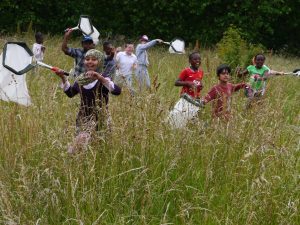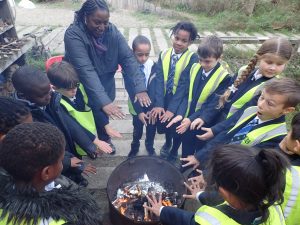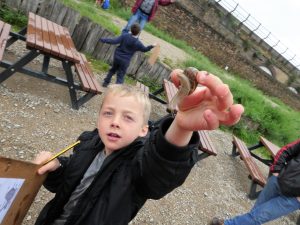Home >
Education >
Education for EYFS & Key Stage 1
Education for EYFS & Key Stage 1
We bring science, geography and history to life through hands-on experiences in the local environment. Programmes at Creekside Discovery Centre allow participants to explore, make discoveries, propose hypotheses, carry out investigations and draw conclusions all whilst engaged in an exciting outdoor activity.
- EYFS & KS1 school visits normally run either 10.00am – 1.45pm or 10.30am – 2.15pm (including 30mins for lunch)
- Class size of up to 30 pupils
- Great Fire of London sessions cost £300 for a full day
- All other EYFS & KS1 sessions cost £275 for a full day
- £25 discount available for schools with >15% of pupils receiving Pupil Premium funding
Programmes available:
EYFS - Understanding the World of Living Things
Understanding the World of Living Things – A programme of habitat sampling including pond dipping and bug hunting.
 Includes opportunities to:
Includes opportunities to:
- Observe and find out about the environment and living things
- Explore what is living in the local area
- Investigate and experience living things
- Develop their own ideas about living things
- Make links between similarities and differences in relation to living things
- Discover the features of the Creekside habitats and how they vary from one another
- Communicate observations of animals and plants and explain why some things occur, and talk about changes.
“I loved it because of all the wildlife and my favourite was finding the grasshopper when we used the nets.”
Year 1/2 - The Great Fire of London
Travel back in time to 1666, become a baker, build a fire and hunt for Samuel Pepys’s buried cheese.
 Includes opportunities to:
Includes opportunities to:
- History, Events beyond living memory – Explore what life in London was like in 1666
- History, Significant historical event – Discover key events during the Great Fire of London
- History, Lives of significant individuals – Become a baker with Thomas Farriner, baker to the King, and help Samuel Pepys, the diary writer, find his cheese
- Design and technology, Make – Place paper and wood in a fire drum to light a fire
- Design and technology, Make – Make bread dough using a range of ingredients and bake the bread over the fire
- PSHE – Make safe and informed decisions about risk
“Excellent programme - lots of led/easily self-led activities. Built on existing knowledge of the Great Fire of London.”
Year 1/2 Animals and Plants
Discover the local habitats of Creekside pond and Sue Godfrey Nature Park
 Includes opportunities to:
Includes opportunities to:
- Working scientifically – Observe Minibeasts closely, using simple equipment
- Working scientifically – Gather and record sampling data to help compare and contrast aquatic and terrestrial habitats
- Science, Plants – Identify and name a variety of common plants living in the local environment
- Science, Animals – Identify and name a variety of common animals including fish from the Creek, amphibians from the pond and birds
- Living things and their habitats – identify and name a variety of plants and animals in their habitats, including microhabitats of the pond and grassland of the Nature Park
- Living things and their habitats – Describe how animals obtain their food or create a food chain using animals and plants found in different micro-habitats
- Living things and their habitats – Identify that habitats provide the basic needs for living things and each animal or plant is adapted to survive there
- Science, Animals – Find out about the basic needs of animals and their adaptations to get water, food and air for survival
“I didn't realise how many birds there were around here!”
Download our booking enquiry form

 Includes opportunities to:
Includes opportunities to: Includes opportunities to:
Includes opportunities to: Includes opportunities to:
Includes opportunities to: